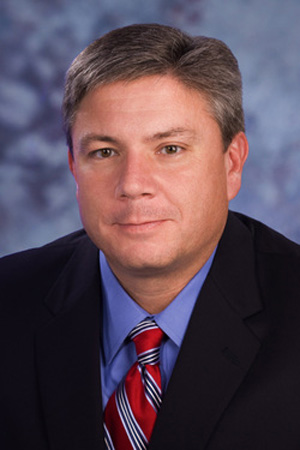FAYETTEVILLE, Ark. – Michael L. Looper, a research animal scientist at the U.S. Department of Agriculture's Dale Bumpers Small Farms Research Center in Booneville, has been appointed head of the University of Arkansas department of animal science, effective Sept. 1.
Looper will coordinate animal science research and extension programs of the University of Arkansas System's statewide Division of Agriculture, along with Tom Troxel, associate department head for extension, based in Little Rock. He will also coordinate academic programs leading to B.S., M.S., and Ph.D. degrees in animal science in the Dale Bumpers College of Agricultural, Food and Life Sciences on the Fayetteville campus.
"It's a humbling thing for me," Looper said. "I'm an alumnus of the University of Arkansas and from this department, and it's an amazing opportunity for me to be able to come back and help lead our people."
Mark J. Cochran, the University of Arkansas System's vice president for agriculture, said, "I am excited that Dr. Looper is joining the leadership team for our teaching, research and extension programs in support of the state's livestock industry."
"Arkansas has some 1.8 million head of beef and dairy cattle on about 28,000 farms with more than 5.5 million acres of pasture and hay fields," Cochran said. "Dr. Looper has the experience and dedication to help lead our outstanding faculty in meeting the needs of Arkansas beef and dairy producers, locally important swine enterprises and horse enthusiasts."
Michael E. Vayda, dean of Bumpers College, said, "Dr. Looper has excelled as a scientist and teacher and will be a great role model as well as an effective leader. He exudes a contagious enthusiasm that will inspire our students who are preparing for professional careers in veterinary and human medicine; equine sciences; management of animal enterprises; and meat quality.
Looper was raised on a fifth-generation beef and dairy cattle farm in Arkansas. He earned bachelor's and master's degrees in animal science from the University of Arkansas and a doctorate from Oklahoma State University, where he studied the physiological mechanisms of reproduction in cattle. In 1999 he joined the faculty of New Mexico State University as an extension dairy specialist and assistant professor.
Since 2002, Looper has served as a USDA Agricultural Research Service animal scientist at the Dale Bumpers Small Farms Research Center. He served as lead scientist of the Food Animal Production Program, responsible for oversight and accountability for the program's approximately $1 million budget. While at the Booneville center, Looper developed strong collaborative partnerships with numerous universities, federal and state agencies and industry partners.
Serving as adjunct faculty at the University of Arkansas, Looper has mentored numerous graduate students. He also trained graduate students at New Mexico State University. He served as adjunct faculty at the University of Arkansas, Fort Smith, where he taught courses in anatomy and physiology and biological sciences.
Looper has authored or coauthored more than 150 non-abstract, scientific publications. He has received numerous awards for research and teaching, including the Presidential Early Career Award for Scientists and Engineers, the highest honor awarded in that field by the U.S. government.
Looper has served at associate editor and currently as Animal Production Division editor for the Journal of Animal Science. He is a member of the American Society of Animal Science, where he is serving on the Executive Committee. He's a member of the American Registry of Professional Animal Scientists, Arkansas Cattlemen's Association, Sebastian County 4-H Foundation, and serves on the Arkansas-Oklahoma Regional Education and Promotion Association Board of Trustees. He is past president of the Southern Pastures and Forage Crop Improvement Conference and the Arkansas Forage and Grassland Council.
"The animal science department has great faculty with international reputations for the quality and impact of their work," Looper said. "And we have terrific students that are highly sought after by employers."
"We also have tremendous facilities with our presence on the university campus and research units at Savoy, Hope, Batesville and Monticello," Looper said.
"The animal science department is poised to be a leading research, education and extension institution that will have a positive impact on the economic development of our producers and the state," Looper said.
Looper said he wants to focus on the end product of the division's animal science research and on those who are using the results.
"We have a great group of stakeholders and they've been extremely instrumental in helping to develop our program," Looper said.
"We're doing research that is applicable to our stakeholders," he said. "We've increased efficiency in production. As we continue, we also want to concentrate on how animal agriculture can be conducted efficiently, productively and profitably with minimum impact on the environment."
"Also, we want to develop students into work-ready graduates," Looper said. "Good students help spread our reputation as a top teaching institution. And when they're successful, they come back and support our programs, helping the next generation of students to succeed."
Contacts
Mike Looper, head
Department of Animal Science
479-575-3745, looper@uark.edu
Fred Miller, agricultural communications
University of Arkansas Division of Agriculture
479-575-5647,
fmiller@uark.edu
